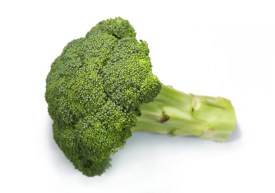
Broccoli is a member of the mustard/cabbage family known as the Brassicacea. Members of this family contain a multitude of compounds that have been and are currently being studied for their health promoting and chronic disease mitigating properties. These compounds include: Diindolymethane (DIM), Sulforaphane, Isothiocyanates and Glucoraphanin. Aside from these specialized compounds, broccoli is also a good source of vitamin C, K, A and fibre.
When investigating nutritional therapy, the most relevant clinical trials are usually those done on a population of people whom are actually consuming significant quantities of the food in question.
A study done in 2008 investigating broccoli’s role in protection against prostate cancer followed a group of men who were either given 400g of broccoli or 400g of peas per week as a dietary addition for 12 months. Samples of prostatic tissue were analyzed before and after the intervention. The results indicated that the group receiving broccoli displayed significant beneficial effects with regard to signalling pathways involved in prostate cancer growth and generalized inflammation. The effects were especially significant in men possessing a gene involved in detoxification “GSTM1” which represents approximately 50% of the population. There were no significant changes in the pea group. Analysis revealed that Sulforaphane was responsible for many of the beneficial effects of broccoli consumption.
In 2003 an epidemiological study was done in Shanghai, China, which investigated the correlation between the development of breast cancer in women and consumption of Brassicacea. The participants levels of Brassicacea consumption were measured by urine output of Isothiocyanates, (compounds in Brassicacea vegetables which help induce phase 2 detoxification). Results indicated a significant reduction in breast cancer in women with high urine levels of Isothiocyanates, therefore a high level of Brassicacea consumption.
An interesting study done in 2001 examined the protective role of Brassicacea on heterocyclic aromatic amine (HAA) metabolism. HAA’s are compounds produced in grilled foods (those yummy charred lines and smoky flavours you get when BBQ’ing your favourite foods. Although tasty, HAA’s are associated with an increased risk of several types of cancer, especially colon cancer. By measuring urinary excretion of certain metabolites from HAA’s investigators were able to conclude that metabolism of HAA’s is enhanced after eating a diet rich in Brassicacea vegetables.
As testament to the power of broccoli and other Brassicacea in health promotion, chemotherapy agents (such as C-DIM’s) have been synthesized using the naturally occurring compounds in this group of vegetables.
It is important to note that prolonged heat exposure will damage the beneficial compounds in broccoli, especially Sulforaphane. Studies suggest that in order to preserve these disease fighting compounds, low heat (such as used in steaming) and short term heat exposure (less than 10 minutes) are key points to remember when preparing Broccoli. Naturally, you can eat it raw too.


